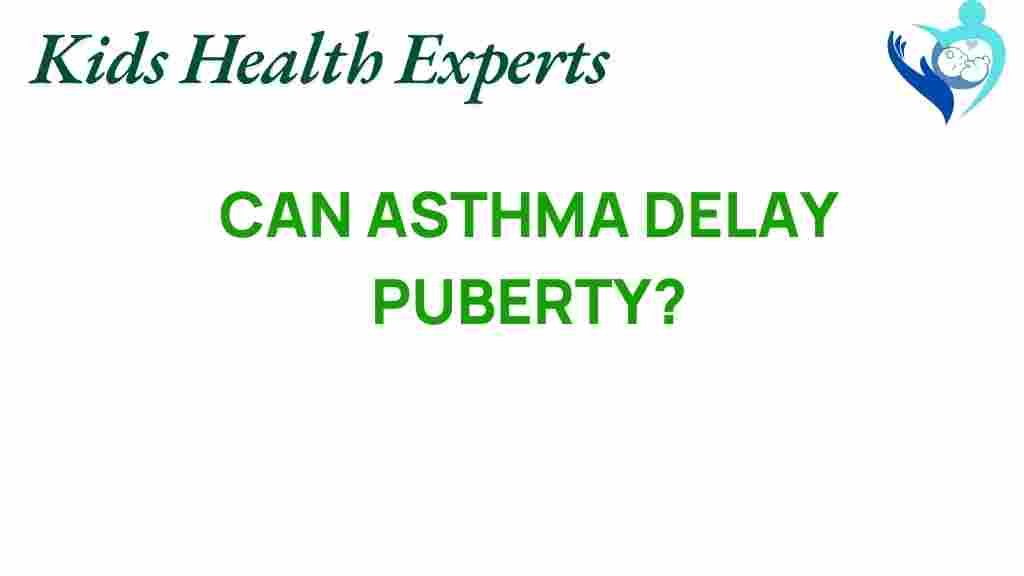Can Asthma Delay Puberty? Understanding the Connection
Asthma is a chronic respiratory condition that affects millions of children worldwide. Its impact on childhood development is significant, raising questions about various aspects of health, including puberty. As children grow, they undergo numerous hormonal changes, and understanding whether asthma can delay puberty is crucial for parents, healthcare providers, and researchers alike. This article explores the connection between asthma and puberty, the health impact of asthma on adolescent health, and insights from medical research.
Understanding Asthma and Its Effects
Before diving into the relationship between asthma and puberty, it’s essential to understand what asthma is and how it affects childhood development. Asthma is characterized by inflammation of the airways, leading to difficulty in breathing, wheezing, coughing, and chest tightness. The severity of asthma can vary from mild to life-threatening, and it often requires ongoing management.
In children, asthma can impact various aspects of their lives, including:
- Physical Activity: Children with asthma may struggle with physical exertion, limiting their participation in sports and outdoor play.
- School Performance: Frequent absences due to asthma attacks can hinder educational progress.
- Social Interactions: Limitations in physical activity can affect social interactions and friendships.
The Role of Puberty in Childhood Development
Puberty marks a significant developmental phase characterized by hormonal changes that lead to physical and emotional maturity. In girls, puberty typically begins between ages 8 and 13, while boys usually start between ages 9 and 14. This phase is crucial for:
- Physical Growth: Rapid growth in height and changes in body composition.
- Emotional Development: Increased independence and emotional complexity.
- Sexual Maturity: Development of secondary sexual characteristics.
Given the importance of this stage in childhood development, any factors that could delay puberty warrant careful consideration.
Does Asthma Delay Puberty? The Medical Perspective
Research on the relationship between asthma and puberty is still evolving. Some studies suggest that children with chronic respiratory conditions, including asthma, may experience delayed puberty due to various factors:
1. Hormonal Changes and Asthma
Asthma may influence hormonal changes that are critical during puberty. Chronic inflammation and stress associated with asthma can impact hormone levels, such as:
- Cortisol: Elevated cortisol levels due to stress can affect growth hormones.
- Sex hormones: The interplay between respiratory health and reproductive hormones is still under investigation.
2. Physical Limitations
Children with asthma often face physical limitations that may hinder normal physical development:
- Reduced Physical Activity: Limitations in physical activity can lead to decreased growth hormone secretion, potentially delaying puberty.
- Increased Fatigue: Chronic fatigue from asthma can affect overall health and development.
3. Psychological Factors
Chronic conditions like asthma can also lead to psychological challenges, including anxiety and depression, which may further complicate the onset of puberty:
- Social Isolation: Asthma can lead to reduced participation in social and physical activities, impacting emotional health.
- Stress and Anxiety: Concerns about asthma attacks can create stress, which might interfere with normal developmental processes.
Medical Research Insights
Various studies have investigated the correlation between asthma and the timing of puberty. While results are mixed, some significant findings include:
- Research indicates that girls with asthma may start menstruation later than their peers without asthma.
- Some studies suggest that boys with severe asthma may experience delays in developing secondary sexual characteristics.
- Chronic respiratory conditions can lead to alterations in growth patterns, which could indirectly affect puberty.
It’s important to note that while some studies indicate a potential delay in puberty for children with asthma, other factors, such as genetics and overall health, also play a crucial role.
The Importance of Monitoring Asthma
For parents and healthcare providers, monitoring asthma is crucial in supporting healthy childhood development. Effective management of asthma can help mitigate its impact on growth and puberty. Here are some strategies:
- Regular Medical Check-ups: Ensuring regular visits to a healthcare provider can help manage asthma effectively.
- Medication Adherence: Following prescribed treatment plans can minimize asthma symptoms and improve overall well-being.
- Healthy Lifestyle Choices: Encouraging a balanced diet and regular physical activity, as tolerated, can promote healthy growth.
Troubleshooting Tips for Parents
If you’re a parent concerned about the impact of asthma on your child’s puberty, consider the following:
1. Open Communication
Encourage open discussions with your child about their symptoms and feelings. Understanding their concerns can help you address them effectively.
2. Educate About Asthma
Understanding asthma can empower children to manage their condition better. Provide resources and education that can help them cope with their asthma.
3. Seek Support
Connect with support groups or counseling services that specialize in childhood asthma. These resources can provide valuable insights and emotional support.
Conclusion: The Need for Further Research
The relationship between asthma and puberty is complex and multifaceted. While there is some evidence suggesting that asthma may delay puberty, the extent of this connection varies among individuals. Factors such as hormonal changes, physical limitations, and psychological health all play significant roles in childhood development.
As medical research continues to evolve, it is essential for parents and healthcare providers to remain vigilant in monitoring the health of children with asthma. By promoting effective asthma management and supporting healthy development, we can help ensure that children reach their full potential during this critical stage of life.
For more information on asthma management and childhood development, consider visiting this resource or consult healthcare professionals who specialize in adolescent health.
In conclusion, while asthma may pose challenges, proactive management and a supportive environment can mitigate its impact on puberty and overall childhood development.
This article is in the category Conditions and created by KidsHealthExperts Team
